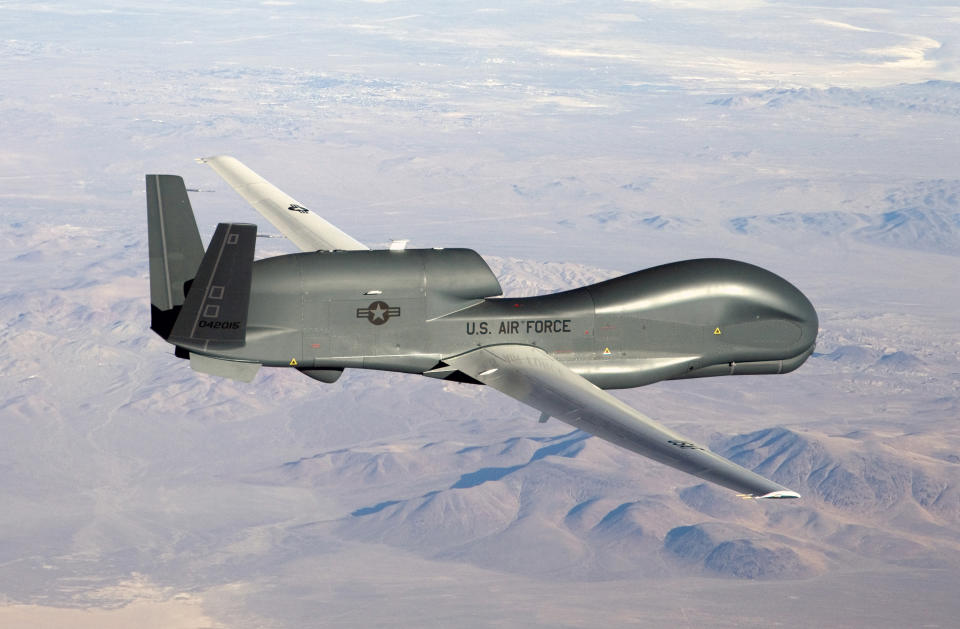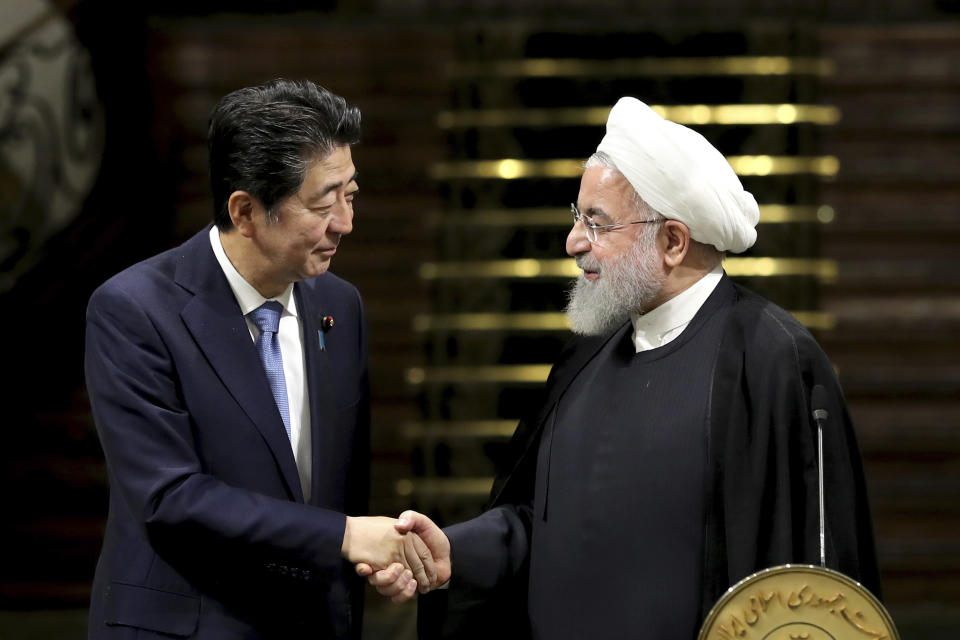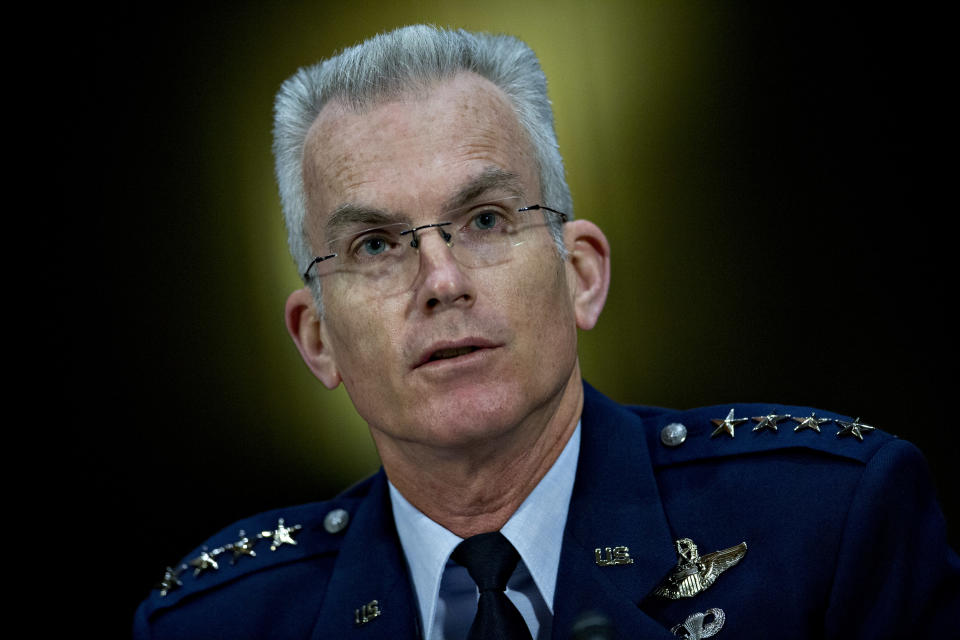Trump says Iran's 'unprovoked attack' on U.S. drone was likely not intentional
WASHINGTON — President Trump on Thursday said he doesn’t believe Iran meant to shoot down a U.S. drone and that it was probably “a mistake.”
“It was a general or somebody who made a mistake in shooting that drone down,” President Trump said from the Oval Office, appearing alongside Canadian Prime Minister Justin Trudeau.
Iran’s latest shootdown of a U.S. military drone appears to fit exactly the scenario that a senior U.S. general warned earlier this week would trigger an American military response, dragging the United States into a military conflict the Trump administration has said it does not want.

“We’ve been very clear in our message that if they directly engage U.S. forces, or they directly engage U.S interests or citizens in the region, that we will respond,” Air Force Gen. Paul Selva, vice chairman of the Joint Chiefs of Staff, told reporters Tuesday, before the drone shootdown.
Iran shot down the U.S. Navy RQ-4A Global Hawk drone early Thursday morning local time over the Strait of Hormuz, according to a statement from Navy Capt. Bill Urban, a spokesman for U.S. Central Command, which is responsible for U.S. military operations in the Middle East.
“Iranian reports that the aircraft was over Iran are false,” Urban said. “This was an unprovoked attack on a U.S. surveillance asset in international airspace.”

Urban’s use of the word “asset” echoed Selva’s comments Tuesday. “If the Iranians come after U.S. citizens, U.S. assets or U.S military, we reserve the right to respond with a military action,” Selva said. “And they need to know that.”
But Trump on Thursday appeared to downplay the importance of the incident, which sparked fears of a possible new military conflict in the Middle East.
“We didn't have a man or woman in the drone,” Trump said. “It would have made a big, big difference."
As tensions have mounted in the Gulf, Trump and senior members of his administration have insisted they don’t want to go to war with Iran, even as they have ramped up the U.S. military presence in the region.
In his splashy campaign kickoff on Tuesday night, Trump returned to an idea that was a key part of his last election bid, expressing opposition to “endless wars” in the Middle East and suggesting he would be the president to bring them to an end.
However, as he stumps with an antiwar message, tensions have steadily grown between the United States and Iran. The Trump administration has withdrawn from the Iran nuclear deal, designated Iran’s Islamic Revolutionary Guard Corps a terrorist organization and deployed more than 1,000 additional troops to the region, while blaming Iran for a series of attacks on commercial ships.

The escalation is occurring during a time of chaos in the administration’s national security leadership. Acting Secretary of Defense Patrick Shanahan, who was Trump’s pick to permanently lead the Pentagon, this week announced he plans to resign, citing his desire to protect his family from a public airing of the details of his messy divorce, which involved accusations of domestic violence.
Meanwhile, two of the administration’s more hawkish members, Secretary of State Mike Pompeo and national security adviser John Bolton, have publicly warned Iran not to provoke the United States. Nonetheless, the White House and other officials maintain that Trump’s position on Iran is clear and that his vision is guiding the posture toward Tehran.
“The president’s Iran strategy is to use maximum economic pressure and stop its malign activities,” said a senior Trump administration official before the latest shootdown. “America is not seeking military conflict with Iran, but in an effort to deter credible Iranian threats, we have made clear that the U.S. has the capability and willingness to defend U.S. forces and interests in the region.”
The president is reluctant to fight but willing to do so if necessary, agreed a former Trump administration official. “The president doesn’t want to go to war, but he will use force to defend American interests,” the former official explained.
“We do not seek conflict with Iran and want to resolve differences through negotiation,” wrote Pentagon spokesperson Navy Cmdr. Rebecca Rebarich in an email Wednesday to Yahoo News.

While Trump’s position on Iran is nuanced, there are more aggressive influential voices in his administration. Press reports have suggested that in the absence of a permanent secretary of defense, Bolton — a longtime hawk on Iran — is wielding an outsize influence over U.S. policy toward that country. And without contradicting the president, recent comments by Bolton and Pompeo have taken a harsher tone toward Iran than those of Trump, who described June 13 attacks against two tankers in the Gulf of Oman as “very minor.”
As Trump’s national security adviser, Bolton has the job of supporting Trump’s agenda and leading coordination with government agencies to ensure they follow through on it. In an interview with the Washington Free Beacon, a right-wing website, Bolton said the notion that he was trying to push the president toward war with Iran was an idea promoted by the Iranian government and “stenographers in the American media.”
Bolton and Pompeo both work closely with Trump and follow his lead, according to Fred Fleitz, who served as Bolton’s chief of staff on the National Security Council last year. “Bolton is very particular about not getting ahead of the president,” Fleitz said. “The president makes the policy.”
Trump has appeared eager to avoid war. He even dispatched Japanese Prime Minister Shinzo Abe to Iran as an emissary, according to Pompeo, who mistakenly referred to the Japanese head of state as “President Abe” in remarks Tuesday.

“President Trump had sent President Abe to take a message of his to the leadership in Iran,” Pompeo told reporters during a visit to MacDill Air Force Base in Tampa, which is home to U.S. Central Command and U.S. Special Operations Command.
The Japanese Embassy in Washington did not respond to a request for comment.
Japan is one of several Asian countries that together import most of the oil shipped from the Persian Gulf via the Strait of Hormuz, the narrow entryway to the Persian Gulf that Iran has threatened to shut down.
In any case, Abe’s trip appears to underscore the administration’s approach, whether acknowledged or not, in engaging allies.
Speaking to reporters on Tuesday, Selva said there will be no U.S. military response to the tanker attacks without support from the international community.
“It’ll require an international consensus before force is used,” Selva said.
In one sign of at least some tension between the more hawkish voices in the president’s orbit, one former Trump administration official expressed dismay when told about Selva’s comments. According to the former Trump administration official, the reliance on international consensus does not fit with the “America First” agenda the president ran on in 2016.

Waiting for “international consensus means giving the Europeans and Russia veto” over U.S. policy toward Iran, the former official said. “‘America First’ means we’re not getting into globalism, we’re not asking for permission to take action,” the former official added.
The White House did not respond to questions about Selva’s remarks.
Selva, however, said that if Iran or any of its proxy forces were to attack U.S. targets, military or otherwise, it would guarantee a U.S. military response. “We want them to be very clear-eyed in whatever it is they are planning, so that they know we are also very clear-eyed in the necessity to respond,” he said.
The United States is more willing to back up its words with action than it might have been in its past dealings in the Middle East, according to Selva. “It is a fair assessment that our history in the region is, we have threatened to respond but not responded,” he said. “That would be a miscalculation on the part of the Iranians to believe that that’s going to persist.”
Selva also shed light on the messages he said U.S. interlocutors have sent to Tehran. Because “the risks of miscalculation are real,” Selva said, the United States has sent one signal to Iran via the Iraqi government, the Swiss government and through public statements: “Hands off: Don’t come after our forces.”
Even so, Trump’s message on Thursday was not specific on what actions the United States might undertake in response.
“Let's just see what happens,” he said. “It's all going to work out.”
_____
Read more from Yahoo News:


